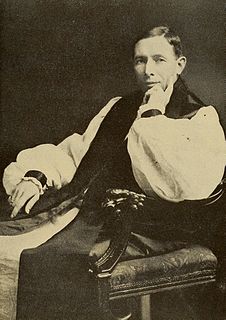A Quote by Kevin Hart
What you find I think in the mystical strain of Catholicism is that you're put in relationship with God, and you have many opportunities not only of talking with God in petitionary prayer, but also of listening to God, being attentive to God, as happens in contemplation.
Related Quotes
Catholicism is the big house of Christianity. It's got many, many rooms in it. And I've always been attracted to the rooms which are to do with prayer. The mystical strain is the strain whereby the whole day can be given over to prayer through what we call lectio divina, prayerful reading of Scripture, through practice of meditation of when one uses the imagination and the intellect with respect to images, and then finally, and most difficult of all, contemplation, where one empties the mind of all images and all ideas, all concepts, in order to be completely attentive to God.
When I was in my early 20s I converted to Catholicism after a long period of searching. What I think drew me to the Catholic church is that in Catholicism, prayer suffuses all of one's life by virtue of the sacraments. Prayer is not something which occurs just on Sunday, it doesn't occur only at particular moments of intensity or by particular conventions, one's whole life is given up to prayer in many, many modes. And so everything to do with the faith is trying to put you in relationship with God and trying to make that relationship grow deeper and more mature.
Communication with God is vital to a vibrant relationship with him. We will never really know God in an intimate, personal relationship if we don't talk to him. Half of our communication with God is listening to what he has to say through his Word, which is why reading our Bibles is so important. The other half of communication is talking to him, which is prayer. Prayer is also important because the Bible commands us to pray.
Loving God means rejoicing in God, being eager to think of and pray to God. It means being glad to be in God's presence and to be with God alone. It means not grieving God, but rejoicing in God simply because it is God who is involved, and because we are permitted to know and have God, and to speak with and live with God.
What is sin? It is the glory of God not honored. The holiness of God not reverenced. The greatness of God not admired. The power of God not praised. The truth of God not sought. The wisdom of God not esteemed. The beauty of God not treasured. The goodness of God not savored. The faithfulness of God not trusted. The commandments of God not obeyed. The justice of God not respected. The wrath of God not feared. The grace of God not cherished. The presence of God not prized. The person of God not loved. That is sin.
What it does remind us is that 'God' is not to be separated from the quest for the Kingdom of God and is not and cannot be the object of any detached 'scientific' contemplation. Heidegger's critique of onto-theology is also driving a wedge between speaking of God and the aims of science - not so as to get rid of God but rather to free God from a false objectification.
I would love to have a more earnest prayer life! In my life, prayer is the single most difficult discipline. I love God and there's something in me that would rather do things for God than talk to God. I'm not by nature a mystical, devotional person. I like to do things. And so it's a challenge for me to have a faithful prayer life, but I know God loves me and He's not mad at me. He just wishes I would slow down and turn things over to Him. And that's what I think you achieve through prayer.
Prayer is first of all listening to God. It's openness. God is always speaking; he's always doing something. Prayer is to enter into that activity... Convert your thoughts into prayer. As we are involved in unceasing thinking, so we are called to unceasing prayer. The difference is not that prayer is thinking about other things, but that prayer is thinking in dialogue,... a conversation with God.
Just as in prayer it is not we who momentarily catch His attention, but He ours, so when we fail to hear His voice, it is not because He is not speaking so much as that we are not listening. We must recognize that all things are in God and that God is in all things, and we must learn to be very attentive, in order to bear God speaking in His ordinary tone without any special accent.
To be in a relationship with God is to be loved purely and furiously. And a person who thinks himself unlovable cannot be in a relationship with God because he can't accept who God is; a Being that is love. We learn that we are lovable or unlovable from other people. That is why God tells us so many times to love each other.

































